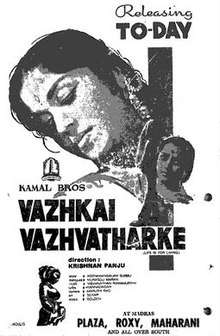Vazhkai Vazhvatharke
Vazhkai Vazhvatharke (transl. Life is for living) is a 1964 Indian Tamil-language romance film directed by Krishnan–Panju. Produced by Kamaludheen under the banner Kamal Brothers, the film stars Gemini Ganesan and B. Saroja Devi. It was released on 7 February 1964.
| Vazhkai Vazhvatharke | |
|---|---|
 Theatrical release poster | |
| Directed by | Krishnan–Panju |
| Produced by | Kamaludheen |
| Story by | Kothamangalam Subbu |
| Starring | Gemini Ganesan B. Saroja Devi |
| Music by | Viswanathan–Ramamoorthy |
| Cinematography | S. Maruti Rao |
Production company | Kamal Brothers |
Release date |
|
| Country | India |
| Language | Tamil |
Plot
Cousins Kandan and Valli have been lovers since childhood. As a boy, Kandan leaves the home of Valli after being insulted and ridiculed by her mother as good-for-nothing and as the offspring of mother whose fidelity has been questioned by her husband. Picked up by a race horse owner, Kandan grows up into a jockey and when he becomes rich, he goes to Valli's home to claim her in marriage. He is again rebuffed and, after several moments of anguish, he clears up the stigma attached to his mother and, when all doubts and misunderstandings are cleared, he re-unites with Valli. With the re-union of the family members, his sister also finds a solution to the problem of her marriage with her lover, a zamindar.
Cast
- Gemini Ganesan as Kandan[1]
- B. Saroja Devi as Valli[1]
- K. A. Thangavelu as the robber and the zamindar[1]
- Radhabai
Production
Vazhkai Vazhvatharke was directed by Krishnan–Panju (a duo consisting of R. Krishnan and S. Panju) and produced by Kamaludheen under the banner Kamal Brothers.[2] The story was written by Kothamangalam Subbu and the dialogue by Murasoli Maran. Cinematography was handled by S. Maruti Rao, and the art direction by A. K. Sekhar.[3] The length of the film was 4,550 metres (14,930 ft).[2]
Soundtrack
The music of the film was composed by Viswanathan–Ramamoorthy (a duo consisting of M. S. Viswanathan and T. K. Ramamoorthy) while the lyrics were written by Kannadasan.[3] The song "Pachai Kuthalaiyo" was sung by L. R. Eswari.[4]
| 1 | Avan Porukkup Ponaan | P. Suseela |
| 2 | Naan Paadiya Paadal | P.B.Sreenivas, P.Suseela |
| 3 | Azhagu Rasippatharke – Vaazhkkai Vaazhvatharke | P. Suseela, chorus |
| 4 | Aadakkaanbathu Kaaviri Vellam | P. Suseela, K. Jamuna Rani |
| 5 | Aathoram Manaleduthu | Latha, Ramamani |
| 6 | Aathoram Manaleduthu – Pathos | P.B.Sreenivas, P.Suseela |
| 7 | Nenjathil Iruppathu Enna Enna | P.B.Sreenivas, P.Suseela |
| 8 | Pache Kuthaliyo – Azhagana Malayalam | L.R.Eswari |
Release and reception
Vazhkai Vazhvatharke was released on 7 February 1964.[3] On the same day, The Indian Express described the story as lacking "life" and the direction as "amateurish", concluding, "The producers, perhaps, want us to believe that this is life and it is worth living."[5] On 21 March 1964, T. M. Ramachandran of Sport and Pastime dismissed the film as a potboiler, but praised the performances of Ganesan and Saroja Devi, while describing Thangavelu, in his dual role performance, as "the real life and soul of the picture".[1]
References
- Ramachandran, T. M. (21 March 1964). "Ganesh Sustains His Name". Sport and Pastime. Vol. 18. p. 50.
- Film News Anandan (2004). Sadhanaigal Padaitha Thamizh Thiraipada Varalaru [Tamil film history and its achievements] (in Tamil). Chennai: Sivagami Publishers. Archived from the original on 6 October 2017. Retrieved 6 October 2017.
- "Vazhkai Vazhavatharke". The Indian Express. 7 February 1964. p. 10.
- Kinnear, Michael S. (1985). A Discography of Hindustani and Karnatic Music. Greenwood Press. p. 497. ISBN 978-0-313-24479-7.
- "Vazhkai Vazhvatharke lacks life". The Indian Express. 7 February 1964. p. 3.